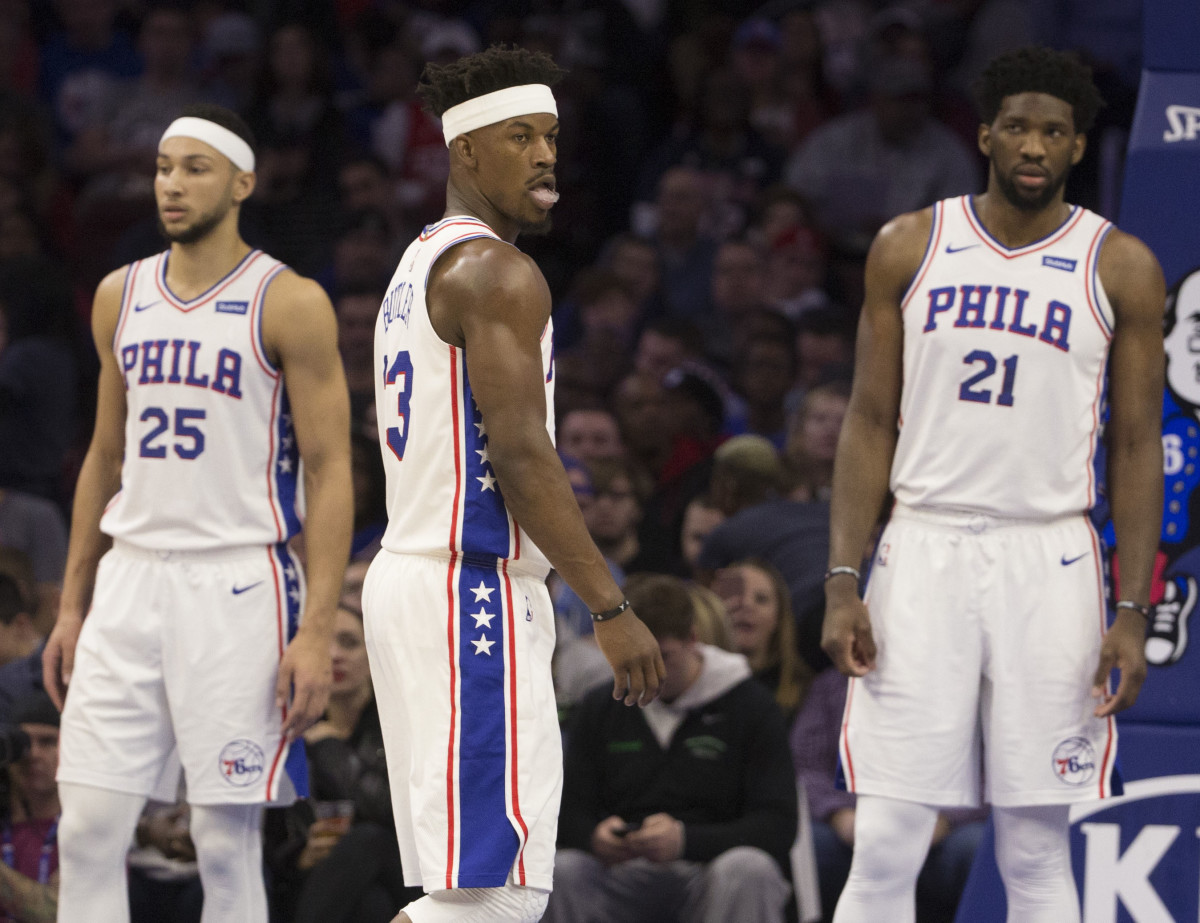NBA Free Agency Is Not Always Your Friend

The Sixers are probably the most widely debated ink blot on the NBA internet. Some people see a team with three stars who don’t really quite make sense, with each needing a different style of basketball to reach their full potential. Others see a team on pace for 54 wins—two more than last season—and a roster stocked with enough unique, top-end talent to overcome shooting deficiencies elsewhere in the lineup. (I fall closer to the former school of thought, mostly because I want to see a team fully constructed around a post-up big one more time before I die.) Philly is undoubtedly good, and in many ways still better positioned for success than most of the league. The biggest issue with the Sixers and a bunch of other hopefuls around the league—and it isn’t even their fault—is that flexibility can only get you so far.
MAHONEY: Courting Kawhi: Can the Raptors Sell Him on Toronto?
"We're trending in tremendous ways. I look at the future of our organization, with healthy Joel Embiid, an improving Markelle Fultz, and draft picks and cap space... There's a lot more coming.”
Those are the words Brett Brown used to describe his team after its series defeat over the Heat in last year’s playoffs. Brown was taking the long lens when asked if he was excited about clearing a postseason hurdle after all the losing he endured for much of his tenure. It’s not often you hear a coach drop the phrase “draft picks and cap space” after a postseason victory, but the results of "The Process" could most clearly be seen last July, when the Sixers had two-budding superstars on their roster, role players on affordable contracts, and the cap space to add two more superstars. Fast forward six months, Philly has its third superstar, but had to give up two of those role players as penance. (And Markelle Fultz is very much not improving.)
This isn’t really about the Sixers, though. They’re going to be fine. Having Ben Simmons and Embiid gives them a giant headstart over many other contender-turned-dynasty hopefuls. What’s interesting about Philly—and is instructive for all the teams heading into this summer with Shark Tank levels of money to spend—is how quickly flexibility can disappear. And free agency is the massive unknown quantity that can immediately derail the best laid plans.

For example, if Philly had signed Paul George last summer, adding even just one star to the roster, it could realistically be playing a Simmons-PG-Saric-Covington-Embiid lineup that would be throttling opponents. Once the Sixers struck out in free agency, they were forced to trade for a star. We can debate the merits of Butler, but it’s hard to argue Philly’s depth isn’t considerably worse than last season, and guys like Covington and Saric will be missed come playoff time. How many more teams are going to face a similar reality this year?
Too many teams have dreams for the summer of 2019. The Knicks, Nets, Clippers, and Lakers, among others, are counting on using the free agency period to springboard them into future success. It’s not a big reveal to say there aren’t enough stars to go around. What if Kawhi Leonard stays in Toronto? What if the Bucks max out Khris Middleton? Can KD and Klay Thompson be convinced to run it back in Golden State? If only one of those players ends up moving, teams will either be hoping Kemba Walker is the answer, or they’ll have little to show for the cap space they’ve spent years curating.
MAHONEY: What's Next for the Wolves After Thibs Firing?
That’s the biggest defense of the Butler trade for the Sixers. Cap space and flexibility can only get you so far. The NBA isn’t a choose-your-own-adventure game. Even the best general managers, ones who meticulously plan out paths forward, are subject to the whims of other players and organizations. Philly couldn’t do anything about George (shockingly, I may add) wanting to make a long-term commitment to the Thunder. On the same token, nobody I knew in July thought Butler would’ve been the Sixers’ third star by the end of the calendar year.
Free agency is a massive risk, and while this summer is shaping up to be a fascinating one, I’m not sure enough time has been given to consider the fallout. What’s the Knicks next step forward if they miss out on Durant? Will the Clippers have to bet on Tobias Harris if they can’t sign a star? Will the Nets decide to start preserving space for 2021? (The 2020 free-agent class isn’t as exciting.) There are going to be painful decisions for general managers to make when the best players don’t neatly slot into the giant spots they’ve created for top-end talent.
It’s funny because flexibility is almost half the fight in the NBA now. Teams without any are considered bleak situations. Team building, especially in the era of Warriors dominance, is entirely predicated on bringing together stars, and GMs are judged on how long they can keep that window open before they either a) tear down and start again or b) decide to pay their own guys and give it a shot. But there’s no accounting for the fickleness of the Paul Georges of the world, players who scream about wanting to leave before not even taking your meeting in free agency.
The Sixers are a great team with a promising-yet-delicate future. They are the envy of many around the league, I’m sure. (Also, they can jump back into the free-agent, star-hunting waters if they let Butler walk this summer.) While some see a great squad and some see an awkward amalgam, I see a warning. Putting your eggs in the 2019 free agency basket is going to be a risky proposition. You can have draft picks, you can have cap space, and you can be trending in tremendous ways. But the domino effect of individual decisions can quickly leave a superstar-desperate franchise in the cold. Flexibility will always be of the utmost importance to NBA general managers. It’s in many ways become the best barometer of organizational competence. Especially with a Wild West-feeling free agency period soon approaching, GMs need to be equally prepared for when things bend the other way.
